Windows Search can show search results from your cloud storage accounts. However, if you want to enable or disable Cloud Content Search in the Taskbar search box, here is how you can do that. It is possible to turn it on or off using Windows Settings, Registry Editor, and Local Group Policy Editor, allowing you to get the job done without third-party tools.
Windows Search is a feature-rich and powerful tool, allowing users to find a file whenever needed. There could be times when you want to get files from your OneDrive, Outlook, Bing, or other online services. As it indexes files and folders according to the user’s requirements, it is possible to include or exclude cloud contents in a Taskbar search result.
How to disable Cloud content search using Settings in Windows 11
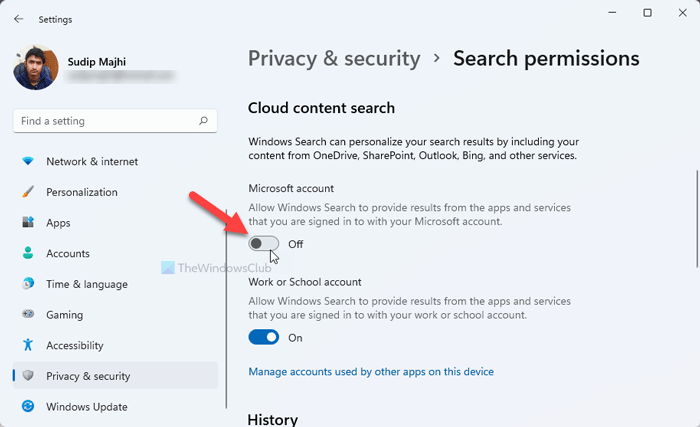
To enable or disable Cloud content search using Windows Settings in Windows 11, do the following:
- Press Win+I to open Windows Settings.
- Switch to the Privacy & security on the left side.
- Click the Search permissions menu on the right side.
- Find out the Cloud content search
- Toggle the Microsoft account button to turn it off.
How to disable Cloud content search using Settings in Windows 10
You can Allow or Disallow Windows Search to provide results from the apps and services that you are signed in to your Microsoft, Work or School account. To enable or disable Cloud content search using Windows Settings, follow these steps:
- Press Win+I to open Windows Settings.
- Go to Search > Permissions & History.
- Toggle the Microsoft account and Word or School account buttons.
At first, you have to open Windows Settings on your PC. For that, press Win+I and go to Search > Permissions & History.
Here you can find a heading called Cloud content search. You have to toggle the Microsoft account and Work or School account according to your requirements.
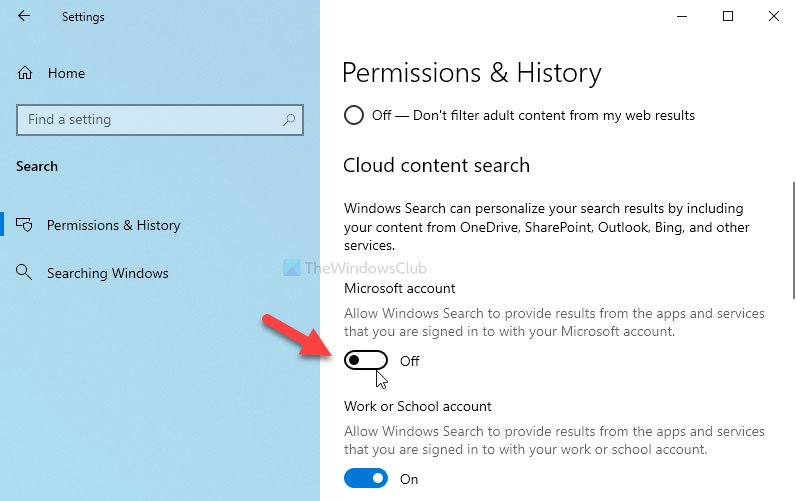
If they are already enabled, and you want to turn them off or vice versa, toggle the same buttons.
Turn off Cloud content search using Group Policy
To enable or disable Cloud content search using Group Policy, follow these steps:
- Press Win+R to open the Run box.
- Type gpedit.msc and press the Enter button.
- Go to Search in Computer Configuration.
- Double-click on the Allow Cloud Search setting.
- Select the Enabled option to turn on and Disabled to turn off.
- Click the OK button.
To know more about these steps, continue reading.
At first, you have to open the Local Group Policy Editor. For that, press Win+R, type gpedit.msc, and hit the Enter button.
Then, navigate to the following path:
Computer Configuration > Administrative Templates > Windows Components > Search
Here you can find a setting named Allow Cloud Search. Double-click on this setting and select the Enabled option to turn it on or Disabled option to turn it off.
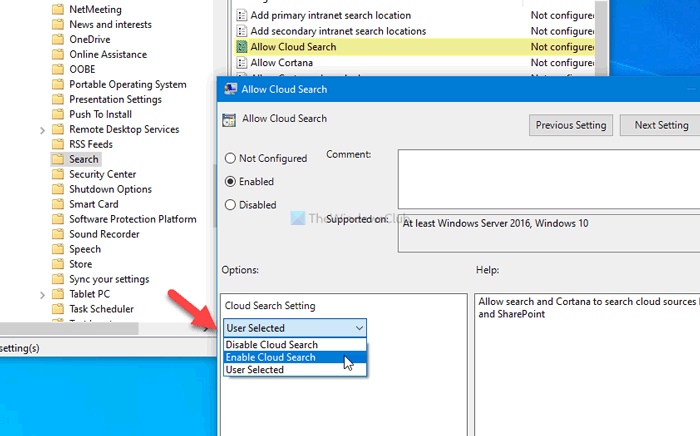
If you choose the Enabled option, you can select one among these three settings:
- Disable Cloud Search
- Enable Cloud Search
- User Selected
Choose the Enable Cloud Search option if you select the Enabled option. Otherwise, you don’t have to select anything.
Click the OK button to save the change.
Turn on or off Cloud content search using Registry
To turn on or off Cloud content search using Registry, follow these steps:
- Search for regedit in the Taskbar search box.
- Click on the individual result and select the Yes option.
- Navigate to Windows in HKEY_LOCAL_MACHINE.
- Right-click on Windows > New > Key.
- Set the name as Windows Search.
- Right-click on Windows Search > New > DWORD (32-bit) Value.
- Name it as AllowCloudSearch.
- Double-click on it to set the Value data.
- Keep 0 to disable and 1 to enable.
- Click the OK button.
Let’s check out these steps in detail.
To get started, search for regedit in the Taskbar search box, click on the individual result and select the Yes option to open Registry Editor. Following that, navigate to this path:
HKEY_LOCAL_MACHINE\SOFTWARE\Policies\Microsoft\Windows
Right-click on Windows > New > Key and set the name as Windows Search.
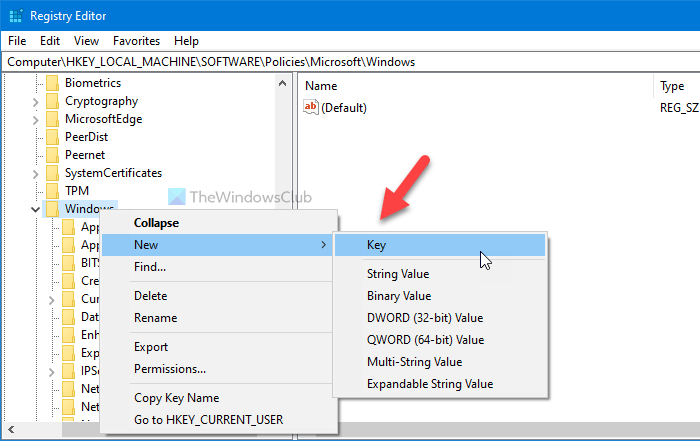
Then, right-click on the Windows Search > New > DWORD (32-bit) Value, and set the name as AllowCloudSearch.
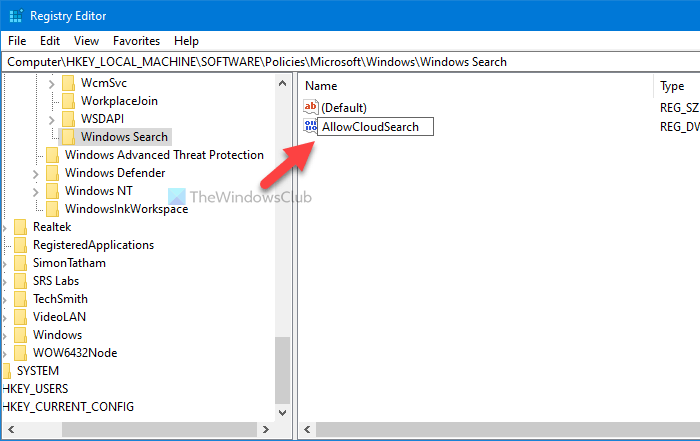
If you don’t want to show the Cloud results in Windows search results, keep the Value data as 0. However, if you want to show the results, double-click on it, set the Value data as 1, and click the OK button to save the change.
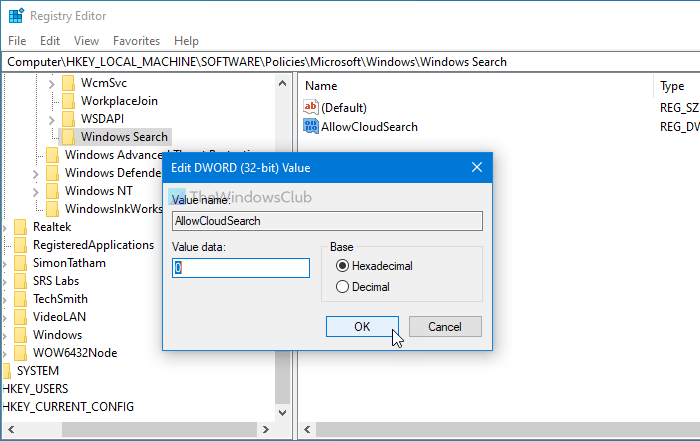
However, if you want to enable or disable Cloud content search for Microsoft and Work or School account specifically, you need to follow these steps.
Open the Registry Editor, and navigate to this path:
HKEY_CURRENT_USER\Software\Microsoft\Windows\CurrentVersion\SearchSettings
Right-click on the SearchSettings > New > DWORD (32-bit) Value, and name it as:
- IsMSACloudSearchEnabled (for Microsoft account) or
- IsAADCloudSearchEnabled (for Work or School account).
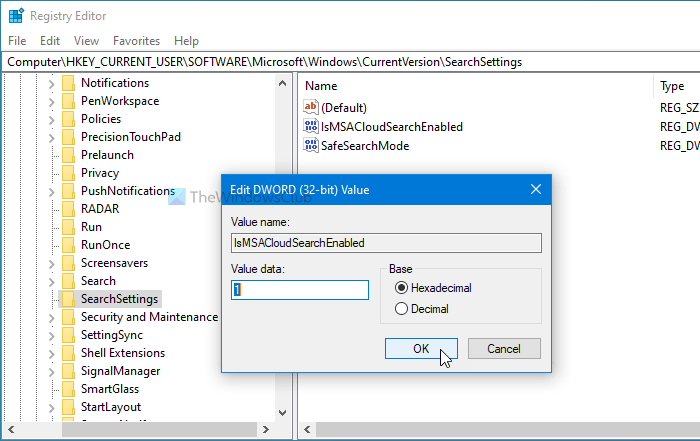
Keep the Value data as 0 to hide the Cloud content search and set the Value data as 1 to show the results.
That’s all! Hope this tutorial helped.
How do I disable cloud search?
To disable Cloud content search in Windows 11 and Windows 10 computers, you can use the Windows Settings panel. In Windows 11, go to Privacy & security tab, open the Search permissions menu on the right-hand side and toggle the Microsoft account button. It is also possible to do the same using the Local Group Policy Editor and Registry Editor.
How do you unlock the search bar in Windows 11/10?
To unlock the search bar in Windows 11 Taskbar, you need to right-click on the Taskbar and select the Taskbar settings option. Then, expand the Taskbar items section, and toggle the Search button to turn it on. Following that, you can find the Search icon on the Taskbar. However, if you are using Windows 10, right-click on the Taskbar > Search > Show search box.
How do I enable the search bar in Windows 11/10 using Registry?
To enable or disable the search icon in Windows 11 using Registry, navigate to this path: HKEY_CURRENT_USER\Software\Microsoft\Windows\CurrentVersion\Explorer\Advanced. Then, double-click on the SearchboxTaskbarMode REG_DWORD value and set the Value data as 1 to show and 0 to hide. Click the OK button and restart your computer.
Read: Search Settings in Windows – Permissions, History, Searching Windows
Leave a Reply